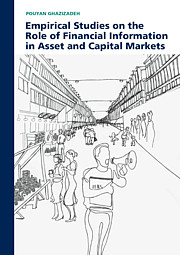Empirical Studies on the Role of Financial Information in Asset and Capital Markets Defended on Friday, 11 January 2019
A primary function of capital markets is to efficiently allocate capital, which entails the flow of capital to investments with the highest returns commensurate with their risk (Tobin, 1984). The market of corporate assets fulfills a similar function, where ideally productive assets are transferred to those most equipped to manage them (Manne, 1965). A large body of scientific inquiry identifies informational frictions as impediments to the efficient functioning of these markets. To mitigate these adverse effects, firms provide financial information to parties external to the firm. For the most part, this information is generated by the firms’ accounting function and its presentation and disclosure are guided by accounting standards. The studies comprising this dissertation empirically investigate several aspects of the role financial accounting information plays in asset and capital markets.
Chapter 2 investigates the voluntary provision of information in the market of corporate assets sales and finds evidence which suggests that these disclosures are used to signal the turnaround of poor prior performance and financial distress. Chapter 3 investigates the effect of changes in accounting standards (i.e., IFRS) on the asymmetric distribution of information amongst capital market participants. The results indicate that IFRS adoption in cross-listed firm’s domestic market improves the liquidity of ADRs, in line with the reduction of the information disadvantage of investors trading on U.S. exchanges. Finally, chapter 4 finds that a commitment to providing conservative accounting information disciplines the allocation of capital by managers when state legislation increases managerial discretion.
Keywords
Voluntary disclosures; Asset sales; Cross-listings; IFRS; Accounting conservatism; Mergers and Acquisitions.













